03 Dec 18 | Campaigns -- Featured, Statements
[vc_row][vc_column][vc_column_text]Index on Censorship is disappointed that Canada’s Supreme Court has upheld a decision by lower courts that requires a journalist with VICE Media to hand over materials related to communications with a journalistic source. A coalition of 12 press freedom and civil liberties groups from around the world, including Index, intervened in the case.
The journalist, Ben Mackuch, wrote articles based on interviews with a suspected terrorist, which led to the Royal Canadian Mounted Police requiring him to hand over all communications with the suspect.
The case raised important issues related to the confidentiality of journalists’ sources. The coalition argued that the protection of confidential journalistic material from compelled disclosure is a fundamental condition of freedom of the press. Without it the watchdog role journalists play in a democratic society is undermined, as sources risk being deterred from sharing information of public interest with members of the press.
Jodie Ginsberg, Index on Censorship CEO, said “The Supreme Court of Canada should have given greater weight to protection of journalistic sources, because it is essential for protecting press freedom. This is a disappointing outcome, which sends the wrong signal to other countries.”[/vc_column_text][/vc_column][/vc_row][vc_row][vc_column][vc_basic_grid post_type=”post” max_items=”4″ element_width=”6″ grid_id=”vc_gid:1543840257753-4c278ff0-3cc9-4″ taxonomies=”6534″][/vc_column][/vc_row]
30 Nov 18 | Mapping Media Freedom, Media Freedom, media freedom featured, News and features
[vc_row][vc_column][vc_column_text]
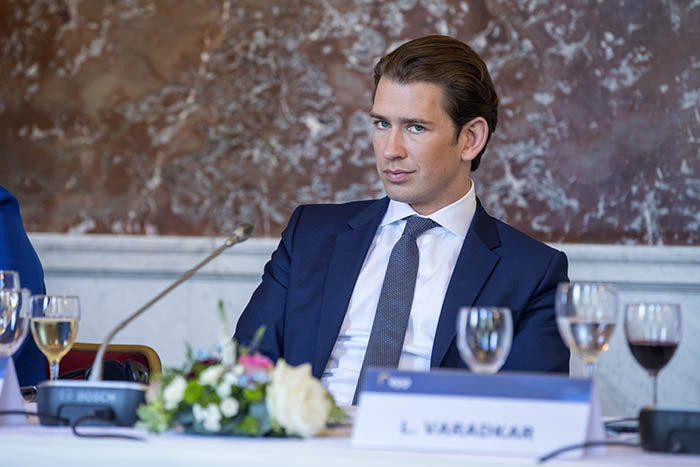
Austrian chancellor Sebastian Kurz. Credit: European People’s Party/Flickr
In an email sent to all regional police departments on 24 September 2018, Austria’s Ministry of the Interior suggested limiting communication with “certain media outlets”, including the weekly news magazine Falter and the daily newspaper Der Standard.
The ministry was quick to clarify that Herbert Kickl of the far-right Freedom Party of Austria (FPÖ), who heads the department, had nothing to do with the email, but that it was the work of a ministry spokesperson. It stressed that it supports “fair co-operation with all media outlets” and announced that new guidelines for media transparency are in the works.
Chancellor Sebastian Kurz and president Alexander Van der Bellen also immediately distanced themselves from the email, making it clear that any restrictions on press freedom are unacceptable. However, Austria is the last country in the European Union where official secrecy outweighs the right to know on a constitutional level. The Global Right to Information Rating ranks the country in the bottom 10 globally for the right to access information held by public authorities.
The country’s General Information Act, which regulates the right to apply for information, does not guarantee journalists and NGOs a general right of access. As a result, state bodies are free to refuse information without having to justify their decision.
Current regulation offers much room for interpretation, leaving public officials with scant guidance on deciding whether to make the requested information public. Despite a recommendation in 2008 by the Council of Europe’s anti-corruption monitoring body to introduce clearer criteria on what kind of information can be limited, reform has yet to materialise.
As any breach of official secrecy law could result in mandatory resignation, public officials seldom exercise their duty to inform. This leads to secrecy being the rule and informing the exception. Journalists also have no guaranteed right to access government documents.
Mathias Huter, secretary general of Forum Informationsfreiheit, a right-to-know NGO, told Index on Censorship that the lack of a freedom of information act undermines the ability of journalists to investigate, making it difficult to hold politicians accountable.
“Investigative reporting remains highly dependent on leaks from inside the administration,” he said. “These leaks, however, usually only tell one part of the story – and often support a government narrative.”
In 2013 Kurz, then State Secretary for Integration, endorsed a campaign to introduce a transparency act. While the campaign itself evolved into the establishment of Forum Informationsfreiheit, Kurz’s enthusiasm for the issue has since waned.
“Kurz has so far failed to deliver on his promise to advance government transparency,” Mathias Huter, secretary general of Forum Informationsfreiheit, told Index. “At the same time, his party has supported several initiatives that expand surveillance and reduce civic space. There is no indication that the ruling parties have any interest in abolishing the official secrecy provision in the Austrian constitution and to replace it with a right to information.”
Restrictions on access to information leave media outlets vulnerable to political attempts to influence news coverage. Florian Skrabal, co-founder and editor-in-chief of the investigative journalism platform Dossier, told Index: “This information asymmetry bears the risk of political alliances forming. Information becomes a good you can bargain with. Every now and then, the phenomenon of journalists with valuable contacts with high-ranking public officials, who suddenly get exclusive information, shows the existence of such political alliances.”
Even if a law granting access to information was in place, Skrabal says it would take years to change the existing culture of treating information as a public good rather than the property of a public body.
Speaking at Austria Österreichische Medientage, an annual conference for media, marketing, communications professionals, in September 2018, Christian Rainer, editor-in-chief of the weekly magazine Profil, described the Ministry of the Interior’s email as an exposure of a practice that usually happens silently, behind closed doors and is not publicly discussed.
But such practice isn’t limited to the current government. In 2016 former chancellor of the Austrian Social Democratic Party (SPÖ), Christian Kern, temporarily boycotted Österreichischer Rundfunk (ORF), the Austrian national public service broadcaster. In 2017 he refused to give interviews to or book ads in the daily tabloid Österreich during the election campaign after the paper published an article deemed too personal and offensive. The article included a leaked email which was sent to former SPÖ political adviser Tal Silberstein describing Kern as a “princess” and “insecure”.
Also speaking at Austria Österreichische Medientage was Wolfgang Fellner, founder and editor-in-chief of the daily newspaper Österreich, highlighted how existing relationships between political parties and certain media outlets — in particular Kronen Zeitung, the largest print media in Austria — affect journalistic practices: “The interior ministry feeds the Kronen Zeitung with exclusive stories, which, in return, is rewarded with positive news coverage.”
“The interior ministry’s email shows the attitude and culture prevalent in Austria regarding information as a negotiable good,” Skrabal told Index. “A journalist becomes a supplicant for information. The leaked email is simply a revelation of an existing mindset on how politicians communicate with the media. That is to distinguish between ‘good’ and ‘bad’ media and, on that basis, to weigh who is eligible to get informed and who does not.”[/vc_column_text][/vc_column][/vc_row][vc_row][vc_column][vc_basic_grid post_type=”post” max_items=”4″ element_width=”6″ grid_id=”vc_gid:1543917445052-57c4ff25-a62a-6″ taxonomies=”6564″][/vc_column][/vc_row]
28 Nov 18 | Academic Freedom, Academic Freedom Reports, News and features, Press Releases
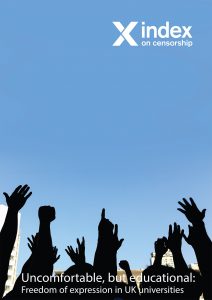
The full report can be read here.
A narrative of safety and risk is hampering freedom of speech on UK university campuses, a new report has found.
‘Uncomfortable but educational‘ — a short report and guide on the laws protecting free speech in universities by freedom of expression campaigners Index on Censorship — calls for more to be done to create an environment in which free speech is promoted as an equal good with other statutory duties. It also identifies Prevent as a key issue.
The report argues that universities should strengthen and simplify codes of practice to clarify their responsibilities and commitment to protecting free speech on campus. It also urges student unions to reaffirm a commitment to freedom of expression in their policies and remove “no-platforming” guidelines that involve outlawing speakers who are not members of groups already proscribed by government.
The report identifies the implementation of Prevent — which places obligations on universities to stop students being drawn into terrorism — as having a pernicious effect on freedom of expression and academic freedom in higher education and calls for an immediate independent review of the policy.
Despite near-daily news stories about attempts to shut down free speech on campus, the report finds that the environment for freedom of expression is poorly understood. Incidents are often misreported, while others — especially levels of self-censorship — are not reported publicly at all. A better understanding of the levels of explicit and implicit censorship on campus, coupled with the development of strategies for the better promotion of freedom of expression and at pre-university level are identified as crucial for ensuring free speech is protected.
The report draws on interviews and research of the sector over the past three years and in particular offers a guide to the legal protections and duties related to freedom of expression. It finds that often duties and rights such as those related to safety are presented as trumping those related to free speech, creating a risk-averse culture in which free speech is seen as a less important right.
“Protecting and promoting freedom of expression should be at the heart of what a university does – not an afterthought,” said Index on Censorship chief executive Jodie Ginsberg. “We want to encourage everyone to consider this as a core value – rather than one that is secondary to other rights and responsibilities.”
For more information or to arrange an interview, please contact Jodie Ginsberg at [email protected] or 020 7963 7260.
23 Nov 18 | Campaigns -- Featured, Statements
[vc_row][vc_column][vc_column_text]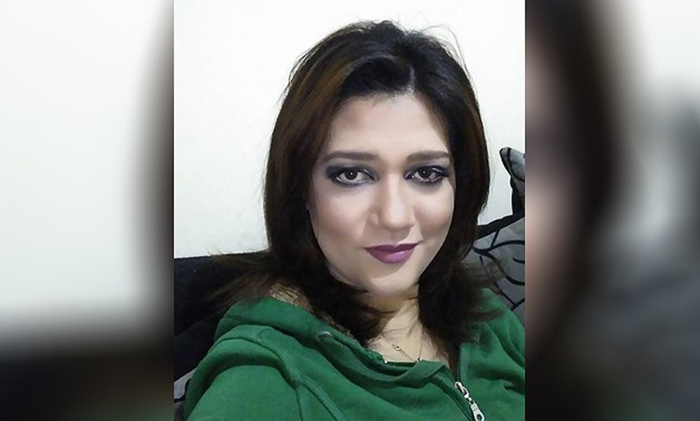
Index on Censorship and international human rights lawyers at Doughty Street Chambers condemn the continued detention of Amal Fathy – an Egyptian activist who made a video about her experience of sexual harassment.
Fathy was arrested on 9 May 2018 and has spent 200 days in detention on charges of “spreading fake news”. On 29 September she was given a suspended sentence of two years in prison on these charges with a £430 fine. Although Fathy was granted release on bail she remains in detention over further charges of “belonging to a terrorist group”, “using a website to promote ideas calling for terrorist acts”, and “intentionally disseminating false news that could harm public security and interest”.
She will appear in court on these charges on Sunday 25 November 2018.
“It is appalling that Amal Fathy remains in detention. Her ‘crime’ has been to speak out publicly about the sexual abuse faced by so many women in Egypt and she should be released immediately,” said Index on Censorship CEO Jodie Ginsberg.
Caoilfhionn Gallagher QC of Doughty Street Chambers said: “Amal Fathy has now been detained arbitrarily for 200 days, in unsanitary and unsafe conditions, without meaningful access to her lawyers, and away from her family and young son. She spoke out about the rights of women; now the Egyptian authorities are silencing her by holding her in prison for months on end, with no proper legal basis. The international community must now condemn Egypt’s flagrant breaches of her basic rights to liberty, due process and dignity.”
Fathy was initially arrested with her husband Mohamed Lotfy, and their two-year-old son. Their Cairo apartment was raided and searched. Lotfy, who leads the Index on Censorship Freedom of Expression Award-winning Egyptian Commission for Rights and Freedoms, which coordinates campaigns for those who have been tortured or disappeared, was later released.
Speaking ahead of Sunday’s hearing, Lotfy said: “The crackdown by the authorities on political dissidents and critical voices in Egypt spreads fear among society and violates the basic rights of freedom of expression. The authorities stick the label of ‘terrorist’ to those who peacefully express critical opinion regardless of the topic — political, social, economic, religious, or even on sport — using anti-terrorism legislation to prosecute and detain holders of such opinions. Not only this is a violation of the right to freedom of expression, but it is also counter-productive in the fight against terrorism. Amal Fathy is a blatant example of this confusion. She is a kind, peaceful and loving person, who suffered from sexual harassment and spoke out against it. She found herself accused of terrorism and detained now for six months.”
After months of pre-trial detention, Fathy’s first court hearing was on 11 August.
Fathy suffers from mental ill health, which has been severely exacerbated by her detention.
On 23 May 2018 Doughty Street Chambers — along with ECRF and Index on Censorship — lodged a complaint with the United Nations Special Rapporteurs on freedom of expression and the protection of human rights defenders on behalf of Fathy and her family. The organisations asked the two Special Rapporteurs to:
- gather, request, receive and exchange information and communications from the Egyptian Government in relation to this case;
- publicly make concrete recommendations to the Egyptian authorities on their duty to adhere to their international obligations; and
- issue an opinion finding that Egypt has failed to adhere to its own obligations, and violated the rights of the complainants, under international law.
On 24 July 2018 an appeal against Egypt was lodged by Doughty Street Chambers, jointly with ECRF and Index on Censorship, with another UN body, the Working Group on Arbitrary Detention. They have complained about Amal Fathy’s detention and called on the Working Group to issue a finding that her detention is arbitrary and in violation of Egypt’s obligations under international law, and to call for her immediate release, and to ask Egypt to investigate her unlawful detention and to award her compensation. The Working Group is considering the appeal.
Update: Amal Fathy’s trial has been postponed to 30 December.[/vc_column_text][/vc_column][/vc_row][vc_row][vc_column][vc_basic_grid post_type=”post” max_items=”4″ element_width=”6″ grid_id=”vc_gid:1543231190492-716c3068-6e3a-2″ taxonomies=”25926″][/vc_column][/vc_row]
22 Nov 18 | Awards, Fellowship, Fellowship 2018, News and features
[vc_row][vc_column][vc_column_text]
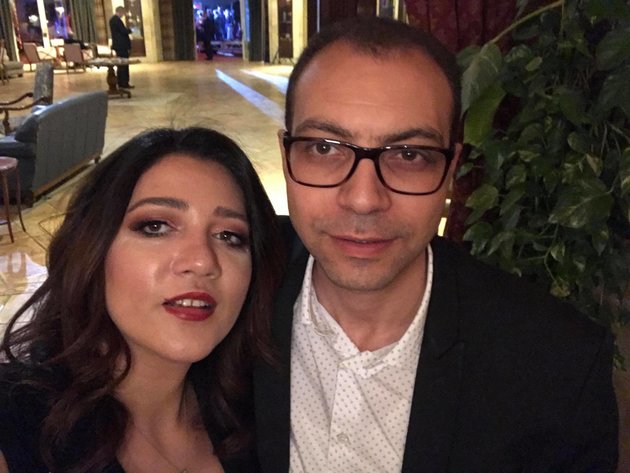
Mohamed Lotfy (right) with his wife, the imprisoned activist Amal Fathy
Mohamed Lotfy, executive director of the Egyptian Commission for Rights and Freedoms, the organisation that won the 2018 Index on Censorship Freedom of Expression Award for Campaigning, has been awarded the Franco-German Prize for Human Rights and the Rule of Law, which is given each year to those who have made outstanding contributions to the protection and promotion of human rights and the rule of law.
“Index on Censorship is very happy to see Mohamed Lotfy’s outstanding work recognised in this way,” said Perla Hinojosa, fellowships and advocacy officer at Index. “We hope this award will help in highlighting injustices occurring in Egypt and the important and much-needed work ECRF does in defending and protecting human rights.”
The announcement was made by Jean-Yves Le Drian, the French minister of Europe and Foreign Affairs, and his German counterpart, Heiko Maas, on 21 November. Lotfy is one of 15 human rights defenders who will receive the award. The official ceremony will be on Human Rights Day on 10 December 2018.
The news comes one day after Lofty marked his four-year wedding anniversary with his wife Amal Fathy, who has been detained since May after posting a video criticising sexual harassment in Egypt.[/vc_column_text][/vc_column][/vc_row][vc_row][vc_column][vc_basic_grid post_type=”post” max_items=”4″ element_width=”6″ grid_id=”vc_gid:1554195663833-6f93bcae-39d6-8″ taxonomies=”24136″][/vc_column][/vc_row]
21 Nov 18 | Academic Freedom, News and features
[vc_row][vc_column][vc_column_text]
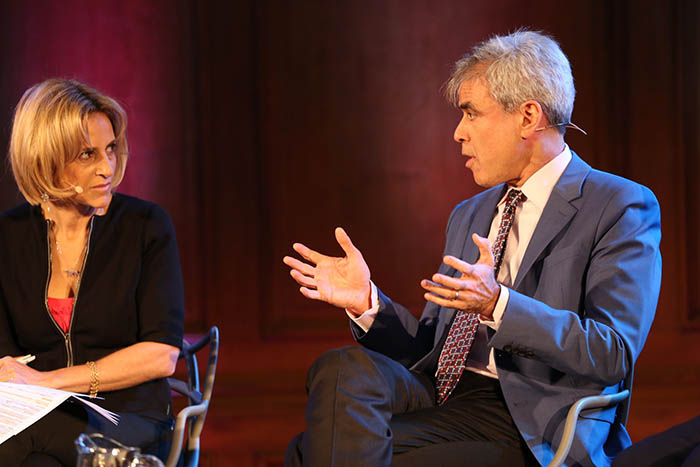
Emily Maitlis and Jonathan Haidt at The Battle Over Free Speech. Credit: Intelligence Squared / Leon Foggitt
“We’re all caught in a minefield,” Jonathan Haidt, a professor of moral psychology, said at an Intelligence Squared panel discussion on education and academic freedom, at the Emmanuel Centre in London on 19 November. “We’re all walking through a world in which one word we say can mean misreported — or partly reported — on Twitter and it blows up into something.”
Also speaking at Battle over free speech: Are trigger warnings, safe spaces and no-platforming harming young minds? were Rabbi Lord Sacks, who was Chief Rabbi of the United Hebrew Congregations of the Commonwealth between 1991 and 2013, Kehinde Andrews, writer and associate professor in sociology at Birmingham City University, and Eleanor Penny, writer, activist and journalist. The event was chaired by Emily Maitlis, presenter of BBC Newsnight.
Most students in the USA and UK want to learn and aren’t triggered by words or ideas, said Haidt, who recently co-authored The Coddling of the American Mind: How Good Intentions and Bad Ideas Are Setting Up a Generation for Failure, with Greg Lukianoff, CEO of the Foundation for Individual Rights in Education. So why then are so many academics working in fear of being reported for insensitivity and when did this phenomenon begin?
“It begins with kids born in 1995,” Haidt explained, referring to what he calls “GenZ” or the “iGen”. In 2013, when at around age 18 the first wave of this cohort made their way to college campuses, terms like “safe space” and “trigger warning” weren’t widely discussed, he said. By 2014, this had changed. “Students were asking for protection from words, books, speakers and ideas — they were treating them as if they were dangerous.”
Difficult and controversial books have always received protest and censure, but the idea that a student could be traumatised or harmed by exposure to them was new, Haidt added.
In the book, this increasingly overcautious approach to education is referred to as “safetyism” — the worship of safety and the perception of the world as being extremely dangerous.
Haidt cited the “mental health crisis for boys and a mental health catastrophe for girls” arising in part from the proliferation of social media, which is much harder on women and men, as a major reason for these changes. “Rates of anxiety and depression, which were fairly stable from the early 2000s to 2010, began rising very sharply,” he added. “For boys, rates of major depression are up about 30%. For girls, they’re up about 40%.”
Rather than “emotional safety”, students now talk about “emotional discomfort”. “Socrates revelled in creating emotional discomfort along the way to learning,” Haidt said. “Many of us are reluctant to do that now, because if I create emotional discomfort in my students, they might take that to mean they are unsafe and there’s a number to call to report me if they think I’ve made them unsafe.”
Haidt said professors no longer trust their students, and that even he has now changed the way he teaches. “I used to be a provocative teacher, but I don’t provoke anymore. I don’t tell jokes, I don’t show them videos.”
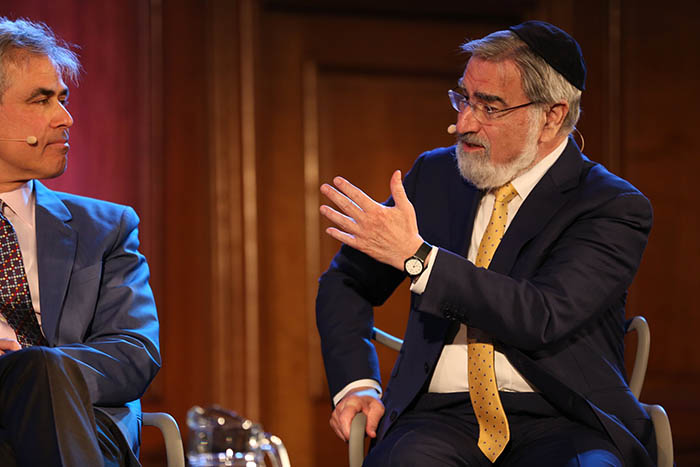
Jonathan Haidt and Rabbi Lord Sacks at The Battle Over Free Speech. Credit: Intelligence Squared / Leon Foggitt
Speaking of the importance of upholding academic freedom, Sacks said: “Society is a symphony score for many voices, and that, to me, is the beauty of the university, and why they’ve become so important while we are disaggregating our societies into non-communicating sects of the like-minded. … All the cries of pain that come from excluding marginalised groups have to be heard, but they have to be heard by all of us.”
Sacks added that he supports free speech because only through a “democratic conversation can we arrive at a society where we can all feel we have a share”.
“That to me is the voice of the university, and why I’m so bothered that the university has gone the way of the rest of society,” he said. “It ought to be a safe space in which we are willing to give a respect for hearing view opposed to our own, knowing that our own views will be given a respectful hearing despite the fact that many of those doing the hearing don’t agree with a word I say.”
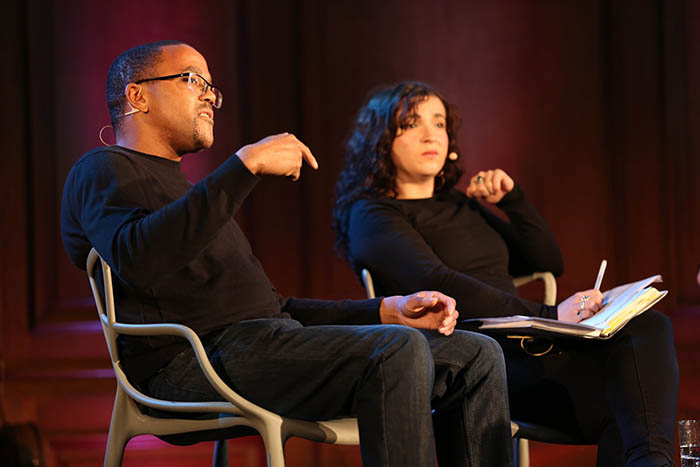
Kehinde Andrews and Eleanor Penny at The Battle Over Free Speech. Credit: Intelligence Squared / Leon Foggitt
For Andrews, “this is the fantasy version of the university, where it’s an institution is built on equality and reason”. He said the irony is that this is a conversation about fragility, but it is the “fragility of the white elite”.
He explained that in 1965, the only group attending UK universities were rich white men. In the half-century since, the institutions have opened up to women, minorities and the LGBT community. “Not surprisingly, these [groups] are who are saying that the universities are powerful, that it’s the universities we need protecting from,” he added. “These institutions, which not too long ago were deciding that I wasn’t a human being, have the same curriculum based on knowledge that says I am not a human being.”
“And then we are somehow surprised when people say we need a safe space,” Andrews said. “And I’m supposed to feel sorry for you because you have to change how you work.”
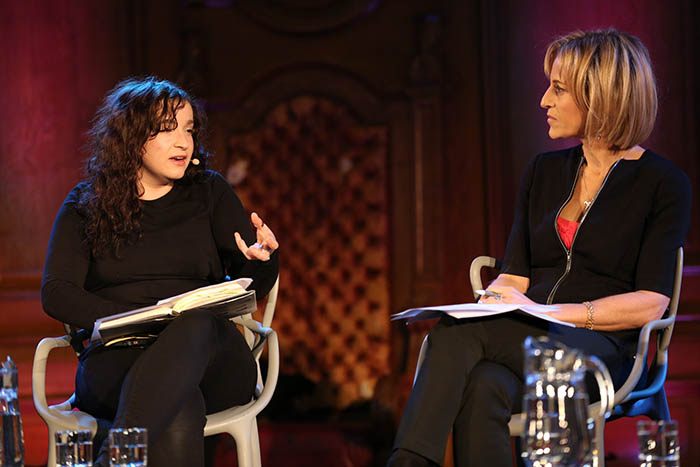
Eleanor Penny and Emily Maitlis at The Battle Over Free Speech. Credit: Intelligence Squared / Leon Foggitt
Speaking about the Oxford Union hosting Donald Trump’s former adviser Steve Bannon on 16 November, which saw more than 100 Oxford University and Oxford Brookes students protest in opposition to the invitation, Penny said: “What we need to understand is that the university as a cultural institution also conveys a stamp of approval, and that’s a stamp of approval that I don’t want to see given to someone who has no interest in protecting free speech.”
Penny added that Bannon’s politics “pose an existential threat to me and people like me”.
“Free speech is fundamentally important because words have an impact,” she said. “To say that we shouldn’t consider the impact of those words in a limited number of cases, such as fascism, is ludicrous, but I think is an under-analysis of free speech.”[/vc_column_text][/vc_column][/vc_row][vc_row][vc_column][vc_basic_grid post_type=”post” max_items=”4″ element_width=”6″ grid_id=”vc_gid:1543941128681-677eb589-8261-7″ taxonomies=”8843″][/vc_column][/vc_row]
21 Nov 18 | Campaigns, Campaigns -- Featured, Statements
21 November 2018
To the attention of:
EU High Representative for Foreign Affairs and Security Policy and Vice-President of the European Commission, Ms Federica Mogherini,
EU Commissioner for European Neighbourhood Policy and Enlargement Negotiations, Mr Johannes Hahn,
We, the undersigned organisations, urge the addressed European Union (EU) officials to discuss Turkey’s freedom of expression crisis and fractured rule of law during their high-level political dialogue with the Turkish government on 22 November 2018.
More than 160 journalists are imprisoned in Turkey today, with hundreds more on trial for exercising their right to freedom of expression. In 2018, the World Press Freedom Index ranked Turkey as 157 out of 180 countries, on the basis of the level of freedom available to journalists. Since 2016, Turkey’s position in the index has progressively decreased from 151 in 2016 and 155 in 2017. Journalists and media outlets are mostly targeted on charges of affiliation with, membership of, or propaganda for a terrorist organisation, charges mostly linked to the attempted coup of July 2016. Despite the lifting of a two-year-long state of emergency on 18 July 2018, and its replacement with similarly restricting legislation, such attacks are still taking place. Just last week, on 16 November 2018, in a targeted operation against civil society,13 people including academics, journalists and lawyers were arrested on suspicions of similar charges, some of whom were subsequently released under judicial control.
Following the attempted coup in July 2016, the Turkish authorities cracked down on independent press and journalists, resulting in widespread closures of media outlets, dismissal of 10,000 media workers and mass prosecutions of journalists. The Turkish judicial system has thus far failed to provide redress in these cases, a further sign of the deterioration of the rule of law in Turkey.
�The European Court of Human Rights (ECtHR) response to this situation has been weak until now: focusing on the need to exhaust domestic remedies as a principle of admissibility of cases before the Court, and failing to fully recognise the impact of the repression of which Turkish journalists and civil society are the victims. Where ECtHR rulings on journalists have been made they have been blatantly ignored and not implemented by the Turkish authorities. Newly introduced legislation in Turkey, dovetailing in many cases provisions concerning purportedly temporary and exceptional measures introduced under the state of emergency in order to respond to the attempted coup, also casts a shadow over respect for human rights in the country.
We remind you that pursuant to the Treaties, the European Union’s “aim is to promote peace, its values and the well-being of its peoples” and that “in its relations with the wider world, the Union shall uphold and promote its values and interests”, including contributing to the protection of human rights. Given the mandate of your roles within the European Union’s system, we urge you to include the above-mentioned issues at the heart of your conversation with the Turkish government during the high-level political dialogue planned in Ankara on 22 November 2018. In particular, we request you to engage with Turkish authorities with a view to agreeing on concrete actions aimed at the protection of journalists and human rights defenders in Turkey, for the respect of the right to freedom of expression in Turkey. Finally, we demand that the EU stresses the need for Turkey to concretely improve its respect for the rule of law and human rights, as a prerequisite for a further deepening of the EU-Turkey relationship.
Yours sincerely,
Article 19
International Press Institute
European Federation of Journalists
Index on Censorship
Reporters Without Borders
Pen International
English Pen
Norwegian Pen
Articolo 21
cc.
Mr Pier Antonio Panzeri, Chair of the European Parliament’s Human Rights Committee European Parliament Rue Wiertz Altiero Spinelli 15G205 1047 Brussels
Mr David McAllister, Chair of the European Parliament’s Foreign Affairs Committee European Parliament Rue Wiertz
�Altiero Spinelli 15G205 1047 Brussels
Mr Christian Berger, Head of EU Delegation in Turkey Büyükesat Mahallesi Uğur Mumcu Cd. No:88 06700 Çankaya/Ankara Turkey
19 Nov 18 | News and features, Youth Board
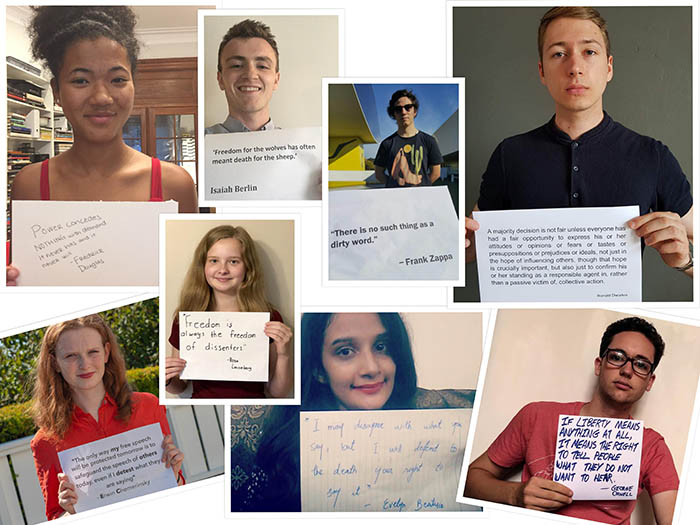
Each youth advisory board sits for six months, has the chance to participate in monthly videoconferencing discussions about current freedom of expression issues from around the world and the opportunity to write blog posts on Index’s website.
The next youth board is currently being recruited. The next youth advisory board will sit from January to July 2019.
We are looking for enthusiastic young people, aged between 16-25, who must be committed to taking part in monthly meetings, which are held online with fellow participants. Applicants can be based anywhere in the world. We are looking for people who are communicative and who will be in regular touch with Index.
Applications include:
- Cover letter
- CV
- 250-word blog post about any free speech issue
Applications can be submitted to Lewis Jennings at [email protected]. The deadline for applications is 19 December at 11:59pm GMT.
What is the youth advisory board?
The youth board is a specially selected group of young people aged 16-25 who will advise and inform Index on Censorship’s work, support our ambition to fight for free expression around the world and ensure our engagement with issues with tomorrow’s leaders.
Why does Index have a youth board?
Index on Censorship is committed to fighting censorship not only now, but also in future generations, and we want to ensure that the realities and challenges experienced by young people in today’s world are properly reflected in our work.
Index is also aware that there are many who would like to commit some or all of their professional lives to fighting for human rights and the youth board is our way of supporting the broadest range of young people to develop their voice, find paths to freely expressing it and potential future employment in the human rights, media and arts sectors.
What does the youth board do?
Board members meet once a month via Zoom to discuss the most pressing freedom of expression issues. During the meeting members will be given a monthly task to complete. There are also opportunities to get involved with events such as debates and workshops for our work with young people as well as our annual Freedom of Expression Awards and Index magazine launches.
How do people get on the youth board?
Each youth board will sit for a six-month term. Current board members are invited to reapply up to one time. The board will be selected by Index on Censorship in an open and transparent manner and in accordance with our commitment to promoting diversity. We usually recruit for board members during May and November each year. Follow @IndexCensorship on Twitter or subscribe to our Facebook feed to watch for the announcements.
Why join the Index on Censorship youth advisory board?
You will be associated with a media and human rights organisation and have the opportunity to discuss issues you feel strongly about with Index and peers from around the world. At each board meeting, we will also give you the chance to speak to someone senior within Index or the media/human rights/arts sectors, helping you to develop your knowledge and extend your personal networks. You’ll also be featured on our website.
19 Nov 18 | Artistic Freedom, News and features, Risks, Rights and Reputations
[vc_row][vc_column][vc_column_text]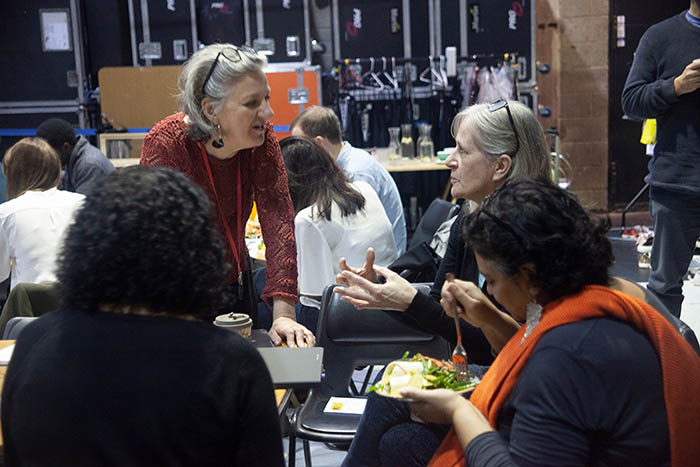
“Art doesn’t divide society, it reveals division,” said Julia Farrington, Index on Censorship’s associate arts producer, at a Risks, Rights & Reputations session at the Young Vic theatre in London on 15 November.
RRR is a training programme developed by Index, What Next? and Cause4 to help art and cultural leaders understand and challenge a risk-averse culture and incorporate these topics within their organisations.
The event kicked off with guests giving a three-worded description of what risk means to them. “Vulnerable”, “essential” and “unavoidable” were among the recurring submissions.
The discussion centred on freedom of expression and the police. Farrington talked about the artist Mimsy’s piece ISIS Threaten Sylvania, which satirically depicts Sylvanian families being terrorised by ISIS through the representation of children’s toys. The artwork was removed from the Passion for Freedom exhibition at London’s Mall Gallery in September 2015 after the artist was given an ultimatum to pay £36,000 for six nights of security protection or to take it down. His decision was clear.
Guidance from the College of Policing recommends artists to take precautionary steps before making a piece of controversial artwork public. First, an artist should seek the upper-most authority and explain their artwork beforehand to avoid cancellation. Then, they should communicate with the local police. There are other actions an artist can take in these situations like have lawyer involvement, but the most effective is to share the artwork in advance to authorities.
Speaking alongside Farrington were Diane Morgan, director of Nitrobeat, and Helen Jenkins, a consultant for Cause4. Morgan held a segment on how organisations can manage difficult subjects, including dialogue and engagement.
In the last segment, Jenkins, who has over 20 years experience in fundraising, talked about raising money ethically and the importance of a trustee’s duty to protect their organisation: if funding is coming from an unethical or compromising source, should the organisation reconsider accepting?
These three voices combined into one vital day of training for CEOs and trustees on navigating the rights and responsibilities of art and dealing the daunting, risky and time-consuming environment that comes with working with sensitive art.
Photographs by Leah Asmelash[/vc_column_text][/vc_column][/vc_row][vc_row][vc_column][vc_media_grid grid_id=”vc_gid:1542885576234-b6a1fb2f-e5c5-7″ include=”103773,103772,103771,103760,103762,103763,103764,103769,103774,103768,103766,103765″][/vc_column][/vc_row]
16 Nov 18 | Campaigns -- Featured, Counter Terrorism, Statements
[vc_row][vc_column][vc_column_text]
The government’s Prevent strategy – which forms one strand of the government’s overarching counter terrorism strategy, CONTEST – seeks to pre-empt acts of terrorism by identifying those at risk of committing such attacks, including by ‘intervening to stop people moving…from extremism into terrorist-related activity’.
Developed without a firm evidence base and rooted in a vague and expansive definition of ‘extremism’, Prevent has been widely criticised for fostering discrimination against people of Muslim faith or background and chilling legitimate expression. [1]
There have been repeated calls to establish an independent review of the Prevent strategy. [2] Three UN independent experts have called on the United Kingdom to launch an independent review of Prevent that incorporates a comprehensive assessment of its impact on human rights. [3]
The Counter-Terrorism and Border Security Bill is currently passing through the House of Lords. Amendments 57 and 57A would require an independent review of Prevent.
We urge members of the House of Lords to support these amendments and take this opportunity to ensure Prevent is at last subject to independent review.
Signatories:
Amnesty International
ARTICLE 19
Committee on the Administration of Justice (CAJ)
Human Rights Watch
Index on Censorship
Liberty
Medact
Rights Watch (UK)
Adriana Edmeades Jones, Legal and Policy Director of Rights Watch (UK), said:
“In the face of mounting evidence that Prevent is undermining relationships of trust and chilling expression in classrooms and consultation rooms across the country, it is clear that Prevent is simply not fit for purpose. It is in everyone’s interests – the communities who are targeted, the teachers, doctors and social workers tasked with implementing it, and the Government itself – that Prevent is subject to an independent review.”
Joy Hyvarinen, Head of Advocacy at Index on Censorship, said:
“An independent review of the Prevent strategy is overdue and essential if the government wants to tackle the widespread doubts about Prevent. The House of Lords should ensure that the Counter-Terrorism and Border Security Bill includes a review of Prevent”
Brian Gormally, Director of CAJ, said:
“If the categories, criteria and methods of Prevent were applied in Northern Ireland there would be an explosion of resentment in both Loyalist and Republican communities. Why then is it alright to use them in communities in Britain?”
Rachel Logan, Amnesty International UK’s Legal Expert, said:
“Prevent is a highly dubious scheme built on shaky, almost evidence-free, foundations – it’s sorely in need of a proper review. Peers need to ensure that Prevent is rigorously and independently assessed, with all the human rights impacts of the scheme fully investigated.”
Letta Tayler, HRW Senior Researcher on terrorism and counterterrorism, said:
“This amendment to the UK counterterrorism bill provides a good opportunity to ensure long overdue scrutiny of Prevent, a key part of the country’s counterextremism program. Intrusive security powers should have independent oversight.”
Footnotes:
[1] See for example Fahid Qurashi, The Prevent strategy and the UK ‘war on terror’: embedding infrastructures of surveillance in Muslim communities; Miqdaad Versi,The latest Prevent figures show why the strategy needs an independent review; Anna Lockley-Scott Preventing what? The flawed assumptions at the heart of the Prevent duty; David Goldberg, Sushrut Jadhav and Tarek Younis, Prevent: what is pre-criminal space; Charlotte Heath-Kelly and Erzsébet Strausz, Counterterrorism in the NHS: Evaluating Prevent Duty Safeguarding by Midlands Healthcare Providers; Teachers back motion calling for Prevent strategy to be scrapped; Royal College of Psychiatrists London, Counter-terrorism and Psychiatry Position Statement PS04/16; Liberty; Rights Watch (UK), Preventing Education? Human Rights and UK Counter-Terrorism Policy in Schools and Open Society Justice Initiative, Eroding Trust: The UK’s Prevent Counter-Extremism Strategy in Health and Education.
[2] See for example 7/7 Survivor and Charity CEO Calls for Urgent Independent Review of Prevent Strategy and MPs and Lords call for review of Prevent anti-terror strategy in schools,
[3] See Letter of the UN Special Rapporteur on the promotion and protection of human rights and fundamental freedoms while countering terrorism concerning the draft Counter-Terrorism and Border Security Bill which is currently under consideration of the UK’s House of Commons; Report of the UN Special Rapporteur on the rights to freedom of peaceful assembly and of association on his follow-up mission to the United Kingdom of Great Britain and Northern Ireland; and End of mission statement of the UN Special Rapporteur on contemporary forms of racism, racial discrimination, xenophobia and related Intolerance at the conclusion of Her mission to the United Kingdom of Great Britain and Northern Ireland.[/vc_column_text][/vc_column][/vc_row][vc_row][vc_column][vc_basic_grid post_type=”post” max_items=”4″ element_width=”6″ grid_id=”vc_gid:1542383020058-48aac27c-d559-4″ taxonomies=”27743″][/vc_column][/vc_row]
14 Nov 18 | Index in the Press
The section on “political interference” said methods they use “can take many forms sometimes subtle (behind-the-scenes phone calls to an editor), sometimes overt (preventing a journalist affiliated with particular outlets from attending a press conference) – but the goal of controlling information flow remains the same”. Read the full article.
14 Nov 18 | Artistic Freedom, Events
[vc_row][vc_column][vc_single_image image=”96667″ img_size=”full” alignment=”center”][vc_column_text]
Risks, Rights & Reputations (RRR) is a half-day training programme developed by Index on Censorship, What Next? and Cause4 to provide arts and cultural leaders with the guidance, inspiration, tools and resources to navigate the rights and responsibilities of producing challenging or socially sensitive work.
Challenging a Risk Averse Culture
“In recent years there have been an increasing number of high-profile cases raising ethical and censorship issues around plays, exhibitions and other artworks. Censorship – and self-censorship – can stand in the way of great art. That’s why Arts Council England is committed to supporting those organisations who are taking creative risks. It’s important that organisations are aware of relevant legislation and the excellent guidance that exists. This programme is an important step in ensuring that our sector can continue to create vital, challenging, and risk-taking work.” – Sir Nick Serota, chair of Arts Council England
Navigating the rights and responsibilities of art that explores socially sensitive themes can appear daunting, risky and time-consuming. We have seen work cancelled or removed, because it was provocative or the funder controversial. But, for arts and culture to be relevant, dynamic and inclusive, we have to reinforce our capacity to respond to the most complex and provocative questions.
“This important and necessary project is a great opportunity to learn and discuss with others the increasing challenges we face in the arts sector, particularly in the context of socially engaged practise and public spaces.” – Mikey Martins, Artistic Director and Joint CEO, Freedom Festival Arts Trust
Session Content
The session addresses the challenges and opportunities related to artistic risk and freedom of expression. It aims to encourage participants to voice concerns and experiences within a supportive environment and programme of presentations, discussion and group work. By the end of day participants will:
- Understand the legal and rights framework supporting artistic freedom in the UK;
- Learn from analysis of recent controversies in the arts;
- Gain confidence in decision-making and planning for potentially controversial work;
- Manage expectations relating to the role of the police;
- Discover the value of creating an ethical fundraising policy;
- Benefit from access to new tools, resources and ongoing support from peers and experts beyond the session.
Participants
The session is open to artistic directors, CEOs, Senior management and trustees of arts organisations.
To date, RRR sessions have been delivered in Manchester, London and Bristol, with Arts Council national and regional offices and in partnership with the Freedom Festival Arts Trust, Hull.
“I feel more confident to speak up when talking to leaders about policy, process and practice when it comes to issues around artistic risk-taking / freedom of expression and ethical fundraising. I feel more empowered to be a useful, knowledgeable sounding board for the organisation’s I support than I did previously.” – Relationship Manager, Arts Council England[/vc_column_text][/vc_column][/vc_row][vc_row css=”.vc_custom_1510749691901{padding-top: -150px !important;}”][vc_column][vc_separator][vc_column_text]
UPCOMING TRAINING
We are currently accepting bookings from CEO/Artistic Directors, Chairs, individual Board Members and senior team members across the country for our upcoming RRR training sessions:[/vc_column_text][vc_row_inner][vc_column_inner width=”1/6″][vc_column_text]Date[/vc_column_text][/vc_column_inner][vc_column_inner width=”1/6″][vc_column_text]ACE Region[/vc_column_text][/vc_column_inner][vc_column_inner width=”1/6″][vc_column_text]Venue[/vc_column_text][/vc_column_inner][vc_column_inner width=”1/6″][vc_column_text]Host[/vc_column_text][/vc_column_inner][vc_column_inner width=”1/6″][vc_column_text]Trainers[/vc_column_text][/vc_column_inner][vc_column_inner width=”1/6″][vc_column_text]Tickets[/vc_column_text][/vc_column_inner][/vc_row_inner][vc_row_inner][vc_column_inner width=”1/6″][vc_column_text]30 November 2018, 12:00 – 17:00 [/vc_column_text][/vc_column_inner][vc_column_inner width=”1/6″][vc_column_text]Northern Ireland[/vc_column_text][/vc_column_inner][vc_column_inner width=”1/6″][vc_column_text]The Black Box[/vc_column_text][/vc_column_inner][vc_column_inner width=”1/6″][vc_column_text]Belfast Festivals Forum[/vc_column_text][/vc_column_inner][vc_column_inner width=”1/6″][vc_column_text]Julia Farrington, Index on Censorship;
Michelle Wright, Cause4
Diane Morgan, director Nitrobeat[/vc_column_text][/vc_column_inner][vc_column_inner width=”1/6″][vc_column_text]From £25. Book tickets for the Black Box session.[/vc_column_text][/vc_column_inner][/vc_row_inner][vc_separator][vc_column_text]
The Team
“This was a really interesting, thought provoking, relevant and empowering session. I really appreciated the knowledge and the care taken to pull it together. Thank you!” – Participant – CEO
The RRR team consists of specialists and facilitators in freedom of expression, artistic risk and ethical fundraising alongside Artistic Director/CEO hosts who are committed to asking the difficult questions of our time:[/vc_column_text][vc_row_inner][vc_column_inner width=”1/3″][vc_single_image image=”103264″ img_size=”full” add_caption=”yes”][vc_column_text]Julia Farrington has specialised in artistic freedom, working at the intersection between arts, politics and social justice, since 2005. She was previously Head of Arts (at Index on Censorship (2009 – 2014) and continues her pioneering work on censorship and self-censorship as Associate Arts Producer. From 2014 – 2016, Julia was head of campaigns for Belarus Free Theatre. She now works freelance and is a member of International Arts Rights Advisors (IARA), facilitator for Arts Rights Justice Academy and Impact Producer for Doc Society, promoting documentary film as a powerful advocacy tool.[/vc_column_text][/vc_column_inner][vc_column_inner width=”1/3″][vc_single_image image=”103265″ img_size=”full” add_caption=”yes”][vc_column_text]Diane Morgan is the Director of nitroBEAT and a consultant/producer. She works in collaboration with artists, leaders and organisations to support (and merge) artistic risk taking and social engagement ideas, practices and approaches. Previous roles include; Project Manager for the Cultural Leadership Programme, Decibel lead for Arts Council West Midlands and Head of Projects at Contact Theatre, Manchester.[/vc_column_text][/vc_column_inner][vc_column_inner width=”1/3″][vc_single_image image=”103266″ img_size=”full” add_caption=”yes”][vc_column_text]Helen Jenkins is a consultant for Cause4, a social enterprise that supports charities, social enterprises and philanthropists to develop and raise vital funds across the arts, education and charity sectors. She has over 20 years experience of working across all fundraising disciplines in senior management and at Board level. Helen has helped organisations nationally and internationally to achieve fundraising targets and retain their ethics within challenging financial climates.[/vc_column_text][/vc_column_inner][/vc_row_inner][vc_separator][/vc_column][/vc_row][vc_row][vc_column][vc_column_text]
[/vc_column_text][/vc_column][/vc_row][vc_row disable_element=”yes”][vc_column][vc_column_text]
Booking Information
Fees
£45 for individuals from organisations with an annual turnover of over £500K.
£80 for two individuals from organisations with an annual turnover of over £500K
£25 for individuals from organisations with an annual turnover of over £250-500K
£40 for two individuals from organisations with an annual turnover £250-500K
Bursaries
Diversity and equality are essential to both the dialogue and learning around artistic risk-taking and for stronger a cultural sector. The programme is actively seeking to be fully representative of, reflect, and to meet the needs of the arts and cultural community across; gender, race, disability, sexual orientation, religion and class.
In order to respond to existing under-representation we are offering a limited number of bursaries to cover the training session fee for BAME and disabled CEO/Artistic Directors, Chairs, individual Board Members and Senior team members, and individuals from organisations with an annual turnover of under £250k who are currently living and working in England.
To apply for a bursary please write to: [email protected] with a short description of your organisation and why you would like to attend this session. Deadline: Friday 9 November.
Access
We aim to provide an inclusive environment and will work with individual participants to make sure we can meet your access needs, such as providing support workers or British Sign Language interpreters or preparing programme materials in alternative formats. Our experienced facilitators aim to be as flexible as possible in order to make the programme work for your particular needs. For access queries please write to [email protected][/vc_column_text][/vc_column][/vc_row]











